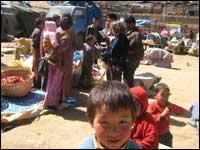Transcript
Democracy is on the march in Bhutan, sort of. The tiny Himalayan nation held its first ever parliamentary elections this week, and the Peace and Prosperity Party trounced the rival People's Democratic Party. No one quite knows why. Apparently, there wasn't much difference between them.
The Bhutanese were ordered to democratize by their king, and there wasn't much enthusiasm for the exercise, at least at first.
The journalists also were a little nervous. After all, it was their first election too.
Andrea Bernstein, political director for our producing station, WNYC, was invited to Bhutan to help train reporters unschooled in the sometimes-indelicate art of political reporting. She sent us back this postcard.
[BACKGROUND HUBBUB/VOICES]
ANDREA BERNSTEIN (NARRATION):
As the story goes here, the people didn't want democracy. But as National Geographic put it, "Kings win arguments" or so newspaper editor told us at tea the morning our training began. He said his parents, uneducated farmers, were among the unconvinced.
UGYEN PAJORE:
When we write about the parties accusing each other of bribery, of forcing people to sign up with the party, sometimes I hear my parents talk, oh we shouldn't have done this.
ANDREA BERNSTEIN (NARRATION):
So that was our task, teaching covering democracy in a society where people didn't really want it.
KINLEY DORJI:
The basic idea really in one sentence is to give Bhutanese journalists as much exposure and training as possible.
ANDREA BERNSTEIN (NARRATION):
That's Kinley Dorji, the editor-in-chief of Kuensel, Bhutan's first newspaper, the one who brought 50 Bhutanese journalists to this U-shaped conference table to learn the basics. And so we began, me and my training partner, Michael Putzel, former AP White House bureau chief.
MICHAEL PUTZEL:
Please, those of you who have questions, do not be afraid to ask –
[SOUND UP AND UNDER]
ANDREA BERNSTEIN (NARRATION):
We taught the five W’s, and fairness. We had writing exercises, guest speakers, practice press conferences. We confronted the problem of teaching political journalism in a non-confrontational society where the two parties, the DPT and the PDP, downplay their differences, where people were never taught to state their preferences, where they never had the need to learn what is perhaps the most important rule for journalism – don't take no for an answer.
[VOICES IN BACKGROUND]
Then came day four, the day the students were dreading. We piled into a van and took them to the bus station and vegetable market. They were there to practice the art of asking questions of people who they assumed didn't want to answer.
[STREET SOUNDS/HUBBUB]
The first interview seemed to confirm their fears.
ANDREA BERNSTEIN:
Ask him what is important to him.
WOMAN:
He doesn't know.
ANDREA BERNSTEIN:
Will he be voting?
ANDREA BERNSTEIN (NARRATION):
But then, the reporters approached a woman who was upset because she couldn't get her voting card.
[WOMAN SPEAKS BHUTANESE]
MAN:
Voting card -
WOMAN:
Voting card [BHUTANESE]
[OVERTALK/SEVERAL AT ONCE]
ANDREA BERNSTEIN (NARRATION):
The woman had problems with her papers and wanted to vote, but couldn't. Over by a giant pile of green onions, Kesang Dema of Kuensel was speaking to the woman who cleaned the market.
KESANG DEMA:
She has six kids. Then the eldest is unemployed. Her husband expired eight months ago.
ANDREA BERNSTEIN (NARRATION):
Bhutanese election law requires voters to return to their home villages to vote. That's sometimes several days’ journey, often on foot and on very hard roads.
KESANG DEMA:
She will go all the way down to south to vote. She has been talking to the bus ticket person, and basically she is keen to go and vote.
ANDREA BERNSTEIN (NARRATION):
Suddenly, the students learned another rule of journalism. People don't always react according to their expectations. I learned that again there in the market.
WOMAN:
Mm-hmm.
ANDREA BERNSTEIN:
So maybe if you want to do one more and then we'll -
WOMAN:
Oh, okay.
ANDREA BERNSTEIN:
- we’ll gather and we'll sort of - I'll start walking everybody that way, okay?
[WOMAN AND MAN TALKING IN BHUTANESE]
Tshering Palen of the Bhutanese Broadcasting System, approached a chili vendor standing alone near baskets of bright red and green chilies. She was ready to state her preference in the ballot box. In fact, she was sure. A friend joined her and chimed in. Then five more women, some with children lashed to their backs, gathered around the young man with the notebook. They all had something to say.
[MANY SPEAKING BHUTANESE]
As we claimed into a van to go back to the training, the students were amazed.
MAN:
I think all are - converted their mind to vote for DPT.
ANDREA BERNSTEIN (NARRATION):
Somehow, under orders from His Majesty the King, the people of Bhutan were becoming engaged, and the journalists were witnessing it, documenting the shift from hesitation to full-throated participation in democracy.
On my last day in Bhutan, Shring Palli, who'd been a journalist for five months and one week, hiked with me up to Taksan, one of Bhutan's most famous monasteries. When we arrived, more than 9,000 feet up, the guard shook his head. No tourists allowed.
Shring patiently explained I wasn't a tourist, I was there on an important training mission. Three times he was told, no. On the fourth time, we were waved in. He didn't take no for an answer.
For On the Media, I'm Andrea Bernstein.

